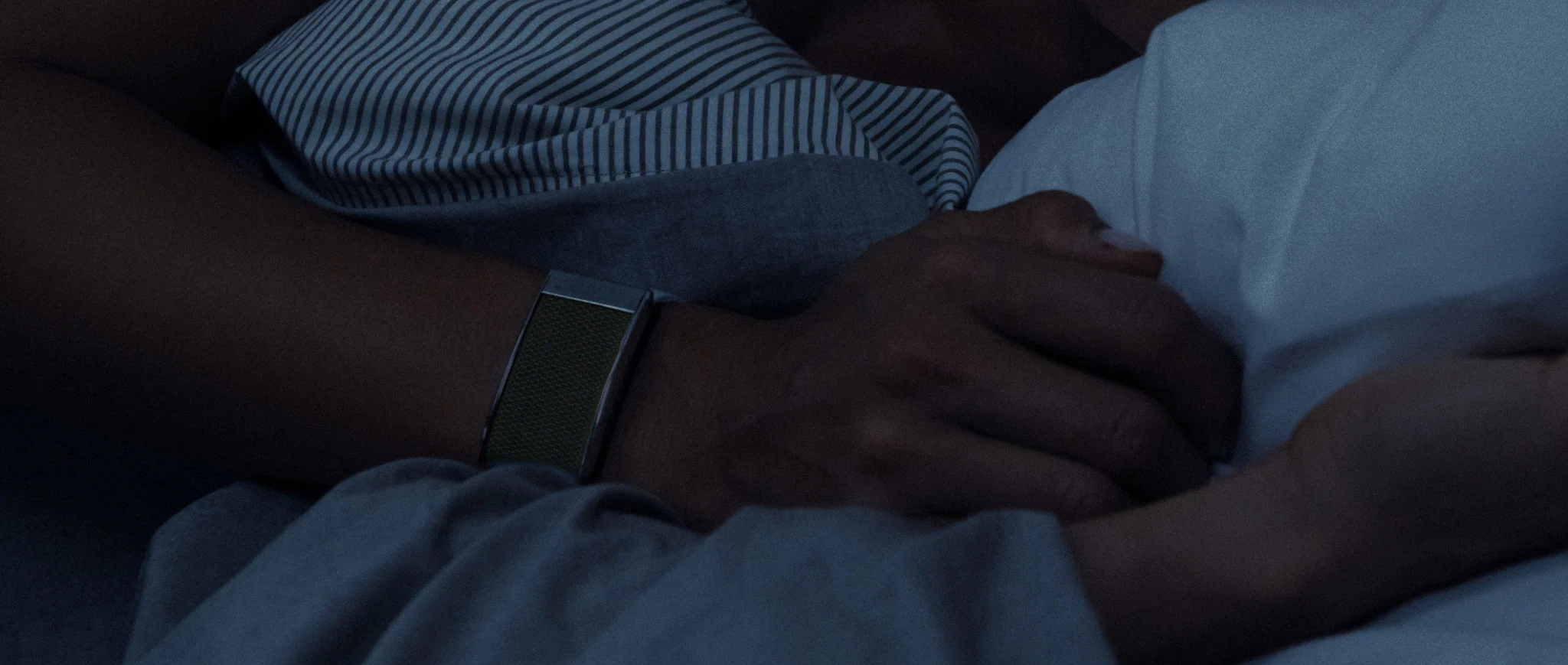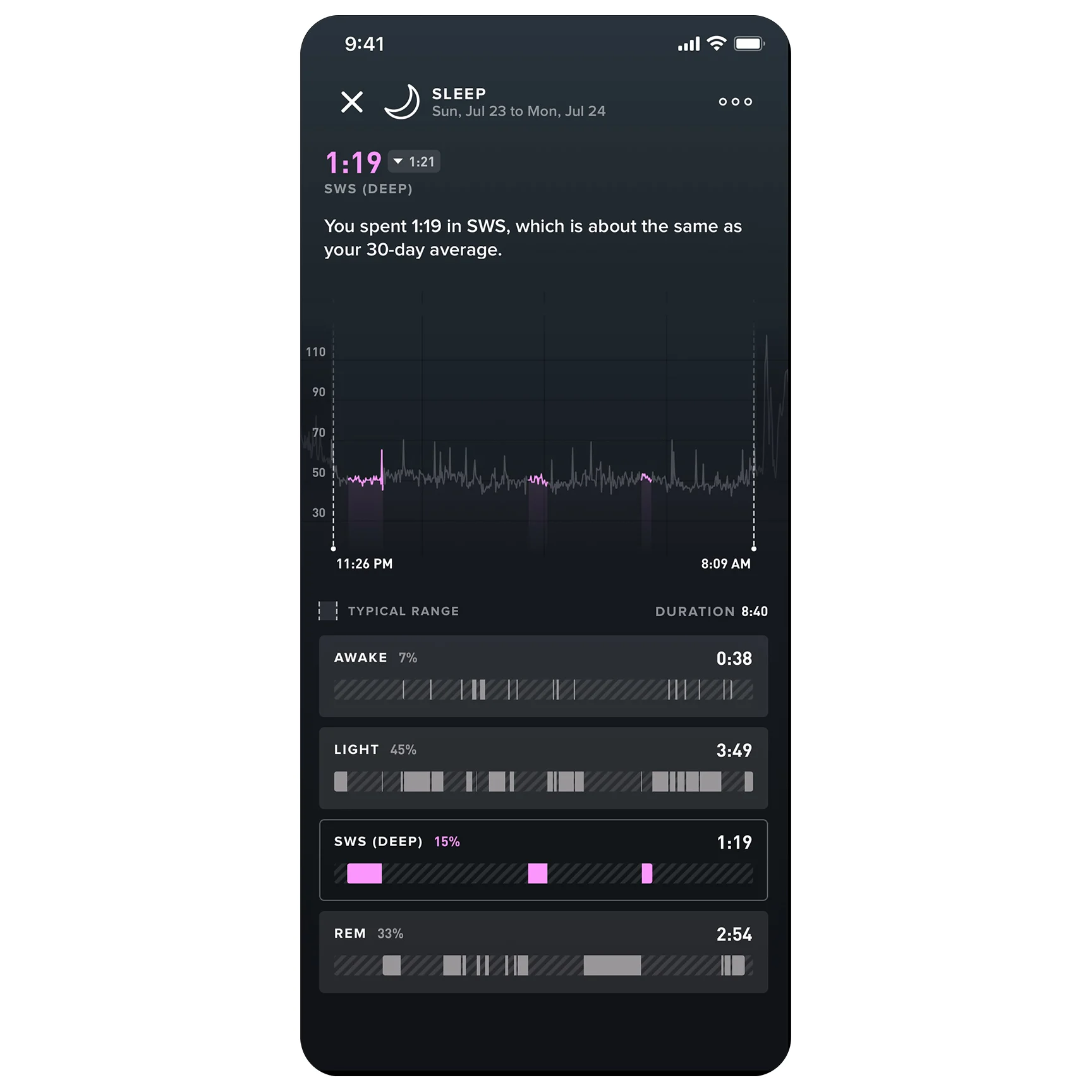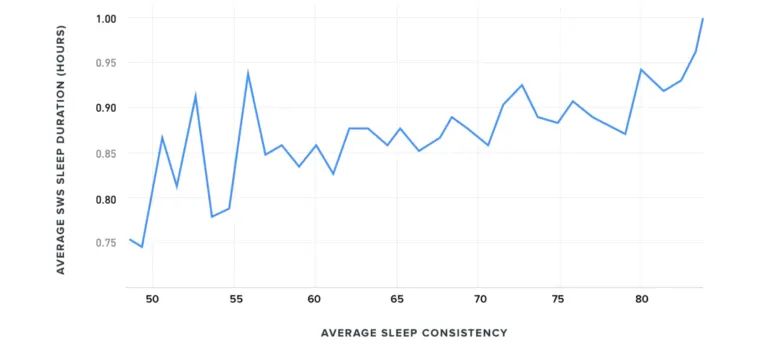Topics
- Article
- Sleep
How to Increase Deep Sleep with WHOOP Data Insights

We’ll explore what you can do to get more deep sleep, including which behaviors we’ve found help WHOOP members increase time spent in this highly beneficial sleep stage.
Deep sleep, also referred to as slow wave sleep (SWS), is one of 4 stages of sleep (light, deep, REM and wake) that you spend time in each night. It is known as the “physically restorative” stage of sleep, and is of great importance for athletes and anyone looking to perform at their best on a daily basis.

Why is Deep Sleep Important?
As stated above, deep sleep is when your body restores itself physically. The vast majority of human growth hormone (95%) is actually produced at this time. Something many people don't realize is that you don’t actually get stronger at the gym or when you’re exercising. Your muscles break down while you’re working out, then they are built back up again during deep sleep. Getting enough deep sleep is essential for maximizing potential gains from your training that day. Additionally, the deep sleep stage helps strengthen your immune system, regenerate cells to repair bone and tissue, stimulate blood flow to muscles, and balance your metabolism and blood sugar levels. Your heart rate and brain waves slow down at this time and it is when your body is in its most restful state. Learn more about the differences between deep and REM sleep.
How to Improve Deep Sleep
Any efforts you can make to improve your overall sleep behavior will tend to benefit your deep sleep. The most basic thing to do is simply spend more time in bed. Here are 45 tips for a good night's sleep, as well as some suggestions from the National Sleep Foundation. In general, deep sleep usually consists of 15-25% of most adults’ total time asleep. So to reiterate the point above, when our members log in the WHOOP Journal that they sleep in their own bed (as opposed to somewhere else), on average they get 15 additional minutes of total sleep, with 3 minutes of that (20%) being deep sleep (labeled SWS in the chart below)--a proportional increase in deep sleep along the lines of what should be expected.

WHOOP Journal data shows Positive effects of sleeping in your own bed on sleep, deep sleep, and other Metrics.
Data from our journal feature also shows that things like proper hydration during the day (+6 minutes total sleep, +1 minute SWS), wearing a sleep mask and using a sound machine (both +5 minutes total sleep and +1 minute SWS) all correlate with a similarly proportional increase in total sleep and deep sleep. However, we have observed that some sleep-promoting behaviors specifically boost the amount of deep sleep at a higher-than-expected ratio when compared to overall sleep time...
Best Ways to Get More Deep Sleep
- Blue-light blocking glasses as part of your bedtime routine. Opinions vary, but it may be worth putting them on up to 3 hours before you go to bed.
- Ear plugs while sleeping.
- Breathwork to relieve stress, either during the day or prior to sleep. Here’s more about diaphragmatic breathing.
- Massage therapy, and in particular the practice of cupping, after which our members average 1 more minute of deep sleep despite no increase in total time asleep.
- Steam room and sauna, with the dry heat of a sauna correlating with the greater proportional increase in deep sleep between the two.
- Plant-based diet. This is obviously a more significant lifestyle choice, but when WHOOP members report they are following a plant-based diet they average 2 additional minutes of sleep, with half of that (1 minute) being deep sleep.
Deep Sleep Inhibitors
The following things logged in the WHOOP Journal have a negative correlation with deep sleep:
- Stress. When our members report feeling stressed they average 8 fewer minutes of sleep and 1 minute less of deep sleep.
- Device in bed. Use of a screened device in bed corresponds with a 1-minute decrease in total sleep and deep sleep.
- Shared bed. Although WHOOP members average 12 more minutes of sleep per night when they share a bed with another person, they actually lose 1 minute of deep sleep. This doesn’t come as a surprise though, noises and movements from your partner in bed may often diminish your sleep quality.
Additionally, consuming alcohol before bed can be extremely detrimental to deep sleep. It may help you fall asleep, but when your body is forced to process alcohol during sleep it has trouble getting beyond light sleep and into deep sleep. Sleep apnea and other sleep disorders that may prevent you from staying asleep often decrease deep sleep as well.
Sleep Consistency: Our No. 1 Tip to Increase Deep Sleep

A data analysis of sleep consistency (going to bed and getting up at similar times every day) from 25,000 WHOOP members showed a clear rise in nightly deep sleep as the percentage of sleep consistency over a 4-day period went up:

BETTER SLEEP CONSISTENCY INCREASES WHOOP MEMBERS’ DEEP SLEEP.
Sleep consistency helps maintain your circadian rhythm, the body’s 24-hour internal clock. When your body is on a predictable schedule it runs more efficiently and can better anticipate the onset of sleep each night, which in turn benefits your deep sleep and lets you wake up feeling refreshed and recovered. Learn more about WHOOP sleep tracking and how we measure sleep.